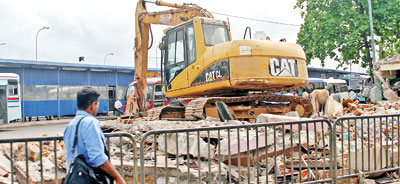Economic implications of corruption
View(s):“Do you know how those businesses have been doing so well?” The question was raised by someone in the group recently referring to some businesses and business locations.
We, a group of friends meeting after sometime, were chatting about corrupt practices by politicians and bureaucrats. Some of us were curious to know the answer to that question from the same friend, who had lots of inside information over these open secrets.
“Don’t think it is because they import and sell cheap Chinese stuff,” he continued. “It is because politicians and officials are on their regular payrolls!”
Many stayed silently looking at him as they wanted more details about it. He began to explain: “Well, for instance, suppose you have to pay Rs. 10 million tax to the government. If you have a choice to cut it down to two million, who wouldn’t spend another one million to get it done? Or if you have the choice of getting your multi-million deal done in two weeks without hanging around for two years, who wouldn’t do that by throwing few million bucks?”
He continued further: “You know that sometimes, actually you have no choice. If you don’t get in there, they can make your life harder. This is the whole problem from top to bottom.”
Timely issue
It is timely that we pick up corruption and bribery today to talk about its economic implications. By definition, “corruption and bribery is the use of political and public office or powers for private gain”. In fact, by definition, “commission” is a modern respectable term for bribery. However in whichever the form and term, it is a cancerous disease that would lead any nation to perish. We are in a regime of so-called “good governance” so it implies that we are committed to fight against this disease.
According to latest reports, our country has been placed under surveillance for its loopholes for international money-laundering too. That is the money earned from corruption and crime related activities globally, and is awaiting to find entry points to the legal transactions and investment process. One might wonder why Sri Lanka is among top rank countries that would provide such entry points for international dealers to take that money to the laundry.
What is true for global money-laundering is obviously true for internal dealings too. There are loopholes for corruption and bribery. From top level business dealings to the lowest ranks of public work such as garbage collection by local governments, corruption has crept into the economy, sending the nation sliding down the path to disaster.
Sri Lanka needs to improve
The latest report of the Corruption Perception Index (CPI) 2017 published by the Transparency International was just released a few days ago. CPI shows how corrupt the public sector is in individual countries in the world, calculating the corruption score and rank for each country.
Sri Lanka that was ranked at the 95th position out of 176 countries in 2016 has improved to the position of 91st out of 180 countries. Ten years ago in 2007, Sri Lanka’s rank was 94th out of 179 countries. In fact, since the time Sri Lanka was added to the CPI estimates, the country continued to remain a low-scoring list of corrupt countries. This shows that there is much to be done to improve the CPI score of Sri Lanka.
Among the least corrupt countries in Asia you’ll find one South Asian country – Bhutan. Among other least corrupt countries in 2017, there is Singapore, Hong Kong, and Japan, while Singapore is among the top-10 least-corrupt countries as well. India and China are less corrupt than Sri Lanka. Surprisingly there are some Latin American and African countries which are not as corrupt as Sri Lanka.
Substitute for reforms
Unfortunately I have noticed economic arguments that are put forward in justifying corruption and bribery; let me elaborate a few of them.

File picture of a building being demolished. Every sphere of public activity breeds corruption.
Highly regulated regimes tend to encourage corruption. Doing business is not easy when there are lengthy bureaucratic procedures, regulatory barriers and complicated mechanisms in place. Corruption then overcomes all these barriers and makes the work more efficient and effective. Therefore, corruption is a substitute for reforms.
Politicians, who are reluctant to undertake reforms for whichever the reason may be, are happy to allow corruption instead. They feel that it makes their life easier.
When corruption becomes way of life, the public sector as well opposes reforms. Therefore, the vested interests of both politicians and bureaucrats find an easy connection of harmony which makes both parties happy and safe, foregoing reforms.
Another justification is the notion that corruption is by and large everywhere in both developed and developing countries; the difference is the level of corruption per given amount of work carried out by the government.
Furthermore, there is also an idea of a positive correlation between corruption and work. In countries where work is done both efficiently and effectively, you won’t find corruption.
All these arguments point to one thing, anyway: These are justifications for lethargic and non-performing reforms more than that for tolerating corruption.
Economics of corruption
Let us have a look at the economic implications of corruption, and see if we can justify it. If some of the businesses are based on corrupt practices as was explained in the example I quoted at the beginning; apparently they have a cost advantage over genuine business practices. The cost advantage is reflected in the market price as well so that corruption would apparently promote corrupt businesses and would destroy genuine business practices.
Taking the same payroll example as I mentioned earlier, it is also the amount of tax money that the government would have otherwise received. It is well reported and discussed that Sri Lanka is among the top-ranked countries in terms of lowest tax to GDP ratios: on average 12 per cent. The loss from taxes through corruption and bribery must have contributed to it too.
Fiscal implications of local money laundering Sri Lanka is also a country that has space for money-laundering, not just internationally but also internally. That is why, even being a middle-income country, Sri Lanka’s tax structure shows one important under-developed feature; lower direct (income) tax ratio of just 18 per cent of the total tax revenue as of 2017. This means, about 82 per cent of the government taxes come from indirect taxes (on goods and services). In more developed and efficient tax systems, this direct-indirect tax composition should be around 50:50 per cent.
The direct tax collection needs a centralized fiscal data system for all the people which record the income and wealth information. For some reason, Sri Lanka was reluctant to progress towards a system as such so that there is space for internal money laundering. No wonder Sri Lanka is under surveillance for international money laundering, when our governments have so far failed to feed just 21 million people into a data based system.
The other side of the coin is that, when direct tax revenue is in disarray producing a smaller tax share, the easy way out of the narrow budget is to rely more on indirect taxes and borrowings. Therefore, the government has to look for more indirect tax sources resulting in higher number of taxes and higher rates of taxes, as we do have in Sri Lanka. When that is also not sufficient, the last resort is borrowings, and we have done it even better.
Deeper economic outcomes
In corruption-free countries, economic progress is better and economic prosperity is higher, as confirmed by many research studies and data reports in the world.
Their economic activities are more efficient and clean, and things move fast. In most corrupt countries, people and, especially the directors and managers of business firms, have to spend more time with politicians and bureaucrats and visit them more frequently.
Corruption and bribery influence the choice of private parties for government contracts and approvals, resulting in market risks and uncertainty. Thus, when the issue becomes well-known nationally and internationally, genuine investors keep away from such corrupt countries unless they have a special incentive to enter there. Could it be one reason why foreign investors keep avoiding Sri Lanka?
Corruption and bribery can also change the outcome of regulatory and legal procedures. If it happens, then it would be difficult for that regime to fight corruption which would begin to spread rapidly throughout every corner of the society.
Perish or prosper
The incidence of corruption varies significantly across different countries.
If it is a rare incidence, then it is quite possible that such incidences can be detected easily, and legal actions would follow immediately. However, if corruption and bribery is systematic and widespread, then detection and legal proceedings become weaker. Moreover, in such situations corruption and bribery will intensify and become a normal way of life.
My last point is that many would blame the “open economy” for intensified corruption and bribery in Sri Lanka. My short answer is that most of the countries with open economic systems are classified as least-corrupt countries; all rich countries in Asia are open economies and they are among the top corruption-free countries, according to the CPI score.
(The writer is Professor of Economics at Colombo University)


